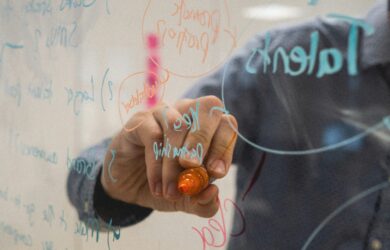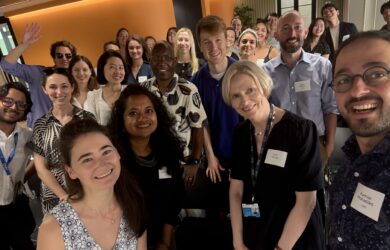
Five Scholars will present their research on subjects ranging from creating an app to encourage healthy eating to transitional justice in Kenya at the Gates Cambridge Annual Symposium next week.
Vegethon is the first known app targeting vegetable consumption to undergo evaluation in a randomised controlled trial.
The five will speak at 2pm on 7 May in the Gates Cambridges Scholars Room at the symposium which will be attended by the Trustees and Trust staff as well as some of the selection panel for new Scholars.
They are:
– Njoki Wamai [2012], who is doing a PhD in Pollitics and International Studies, will talk about Contested Transitional Justice Practices in Kenya: Between International Models and Local Realities. Her research focuses on the tensions between international justice institutions transitional justice practices and local realities in Kenya where the International Criminal Court’s (ICC) outreach staff has been working. She conducted eight months of fieldwork in Kenya using anthropological methods in an attempt to understand locally grounded practices of transitional justice.
She says: "From my findings I argue that multiple meanings of transitional justice practices exist in the local context in Kenya and communities are not passive recipients of ‘top down’ transitional justice concepts and practices from the ICC but active agents who redefine justice based on their own complex, local realities. In advancing this argument I illustrate how concepts such as justice, victimhood and sovereignty are practised and vernacularised at the local level by those the ICC purports to work for and how international insitutions can benefit from understanding local realities before developing transitional justice programmes."
– Jeffrey Lockhart [2014], who is doing an MPhil in Multi-Disciplinary Gender Studies will speak about Contemporary Discourses of Violence in LGBT+ Organising in Britain's Right. He says the UK presents a unique site for studying the intersections of neoliberalism and LGBT politics. He states: "While right-wing LGBT groups have long been active in Western countries, their influence on policy has been limited. In contemporary Britain, however, LGBT groups have demonstrated unprecedented political influence in the right-wing, both in number of elected LGBT officials and in top-level support for their policies. Britain's right-wing LGBT groups offer an opportunity to examine what happens to neoliberal sexual minority politics when they are empowered at the national level, when same-sex marriage has been accomplished, and when they are unencumbered by leftist politics that still carry notions of community and solidarity."
He adds that the neoliberal LGBT groups he studies are explicitly and actively political and in part focus on the ways gays have not yet fully assimilated and construct their politics around the refusal of others to conform to liberal values. He says: "Despite these promising characteristics, their neoliberal frameworks prevent these politically influential organisations from identifying the violence experienced by LGBT people within the UK, particularly those whose lives are most marginal. Instead, if they see anything, it is only isolated incidents and individual victims who merit no broader social policy action."
– Brooke Husic [2014], who is doing an MPhil in Chemistry, will talk about Theory-Aided Drug Design: How computational chemistry can accelerate drug discovery. She says discovering new pharmaceuticals is a complex process involving collaboration across many scientific subfields and sustained cooperation between academia and industry. She states: "From conception to product launch, the development of a single new drug often lasts more than a decade and costs over a billion dollars. One of the limiting steps in the discovery process is the identification of an effective and safe drug candidate for a given target molecule. Developing computational methods that model drugs and the biomolecules with which they interact can drastically reduce this barrier."
She will use Alzheimer’s disease as a case study to present a general overview of the pre-clinical phase of drug discovery and to illustrate how developments in computational chemistry, specifically protein chemoinformatics, accelerate the discovery process. She will discuss her research in protein structure prediction and show how it aims to improve the accuracy of predicted protein structures and the viability of computational methods in drug discovery.
– Sarah Mummah [2012], who is doing a PhD in Public Health and Primary Care, will speak about Mobile Technology for Health Behaviour Change. She says inadequate consumption of vegetables and fruits is responsible for up to 2.6 million deaths worldwide and believes smartphones could be a promising means for delivering scalable dietary behaviour change interventions, due to their ubiquity and ability to provide interactivity, personalisation and just-in-time feedback. For her PhD her aim is to design and test a theory-driven smartphone app with the goal of increasing vegetable consumption. She applied a user-centred design approach with insights from behavioural science to create Vegethon, an iPhone app that enables swift vegetable tracking and includes features that will maximise user engagement.
She says: "After evaluating Vegethon's effectiveness in a randomised controlled trial of overweight adults, I found the app to significantly increase vegetable consumption among users. Vegethon is the first known app targeting vegetable consumption to undergo evaluation in a randomised controlled trial. Given these promising findings, further work is warranted to develop and evaluate theory-driven smartphone technologies that can help us build healthier habits and lead healthier lives."
– Madeline Weeks [2014], who is doing an MPhil in Geographical Research, will talk about Coffee in Veracruz: Linking Quality of Coffee to Quality of Life. She says: "Coffee represents a crucial intersection between rural development and environmental conservation in Veracruz, Mexico. The dense and diversified shade-cover of farms in Veracruz, atypical for larger coffee-producing countries, helps enhance coffee quality and insure the provision of a host of important ecosystem services. Yet farmers in this region have been largely unable to take advantage of these conditions to improve their socioeconomic wellbeing." Her research addresses ways in which coffee as a production system and livelihood can encompass "a multi-faceted construct of wellbeing".
Picture credit: Wikimedia Commons Images and Malakwal City.












